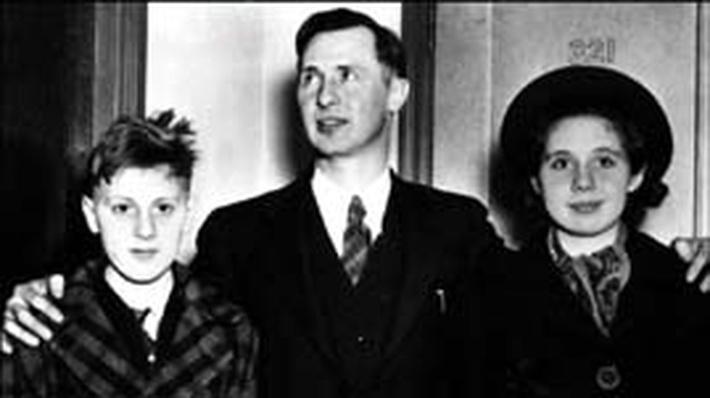THE COURT AND THE FLAG
MINERSVILLE, PA — 1938 — After a long, hot summer, Billy and Lilian Gobitas returned to school with God on their side. Hitler was rising in Germany. War loomed. Yet all that summer, the Gobitas family had discussed the Pledge of Allegiance. The Bible forbade their allegiance to any country’s flag. What should they do?
“Mom and Dad never pressured us or made us feel guilty,” Lilian recalled. “When school opened in September, we were very much aware of what we ought to do."
When Lilian told her seventh-grade teacher she could not salute the flag for religious reasons, “she just hugged me and said what a dear girl I was.” So Lilian, standing beside her classmates, simply mouthed the words “I pledge allegiance. . .” But her younger brother kept his right hand in his pocket, even when his teacher tried to yank it out. Billy then wrote a letter to the school board.
Word spread through Minersville. Folks boycotted the Gobitas store. Kids mocked Lilian and Billy, saying “Here comes Jehovah!” Both students were expelled. The battle had begun.
In 1938, America had just 113,000 Jehovah’s Witnesses, but their refusal to salute the flag was asking for trouble, especially when the Gobitas case reached the Supreme Court.
On June 3, 1940, by an 8-1 vote, the court ruled against the Gobitas family. “National unity is the basis of national security,” Felix Frankfurter wrote. The government could use a flag salute “to promote in the minds of children who attend the common schools an attachment to the institutions of their country.” Six days later, the violence began.
In Maine, a mob burned the local Kingdom Hall. On Long Island, a Jehovah’s Witness was seized, his head smashed against a flag draped over a car hood. A Wyoming man was tarred and feathered. First Lady Eleanor Roosevelt appealed for calm, but that summer, 1,500 Jehovah’s Witnesses were attacked. “They're traitors!” one sheriff said. “The Supreme Court says so. Ain't you heard?”
Jehovah’s Witnesses stuck to their faith, their kids refusing the pledge. Meanwhile, America went to war. Soldiers began coming home in flag-draped caskets. Every morning, school children stood and lifted right arms, palms down. “I pledge allegiance. . .”
Many had recently noticed how the stiff-armed salute, standard since the pledge was written, resembled a “Heil Hitler.” In 1942, Congress changed the gesture to hand over heart, but the pledge marched on. That year, West Virginia declared “refusal to salute the flag be regarded as an act of insubordination and shall be dealt with accordingly."
Students refusing to pledge would be expelled. Parents could be fined $50 and jailed 30 days. When Marie and Gathie Barnett were expelled from a West Virginia grade school, their case made its way through the courts. The following spring, the Supreme Court again took up the pledge.
But the lone dissenter in the Gobitas case, Harlan Stone, was now chief justice. Another FDR appointee sat on the bench. And three justices had reconsidered. When told that Hugo Black regretted his pledge vote, Felix Frankfurter asked, "Has Hugo been re-reading the Constitution?"
“No,” William O. Douglas replied, "he has been reading the papers.“
June 14, 1943 — Flag Day. Since World War I, the day had commemorated the adoption of Betsy Ross’ stars and stripes. Now, the Supreme Court ruled on West Virginia Board of Education v. Barnette (the court clerk misspelled the last name.)
In Gobitas, Frankfurter had written, symbols unify a nation. Justice Robert Jackson disagreed. “A person gets from a symbol the meaning he puts into it,” Jackson wrote, “and what is one man's comfort and inspiration is another's jest and scorn." And unity? “Those who begin coercive elimination of dissent soon find themselves exterminating dissenters."
Felix Frankfurter trusted school boards but Robert Jackson feared “village tyrants.” “If there is any fixed star in our constitutional constellation,” Jackson wrote, “it is that no official, high or petty, can prescribe what shall be orthodox in politics, nationalism, religion or other matters of opinion." Do I hear an “amen?”
By a 6-3 vote, the court sided with the Barnetts. The case has never been overturned.
In 1998, a Southern California high school girl refused to pledge allegiance. MaryKait Durkee did not believe “there is ‘justice for all’ in this country.” The case was quickly decided in local court. Durkee returned to school “with a more positive outlook. . . I have learned,” she said, “that justice is possible through a process.”












